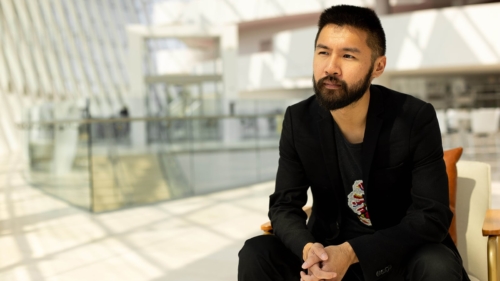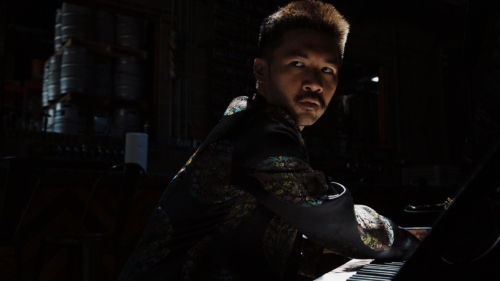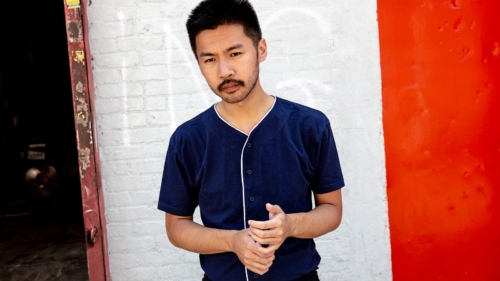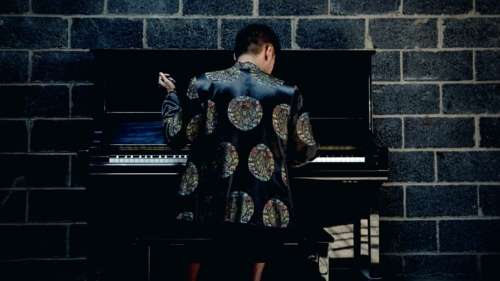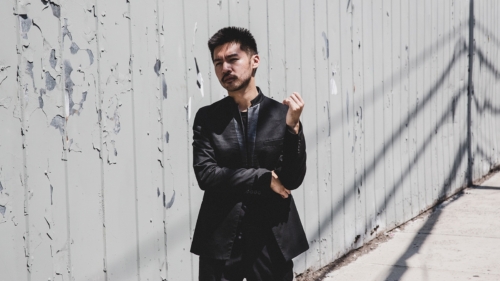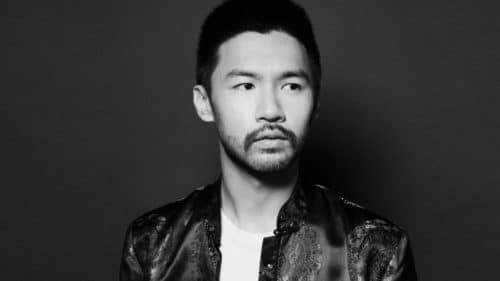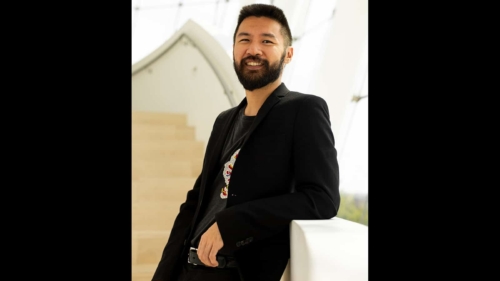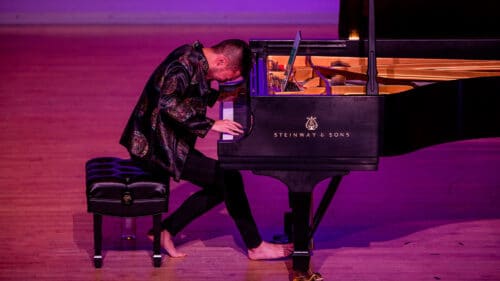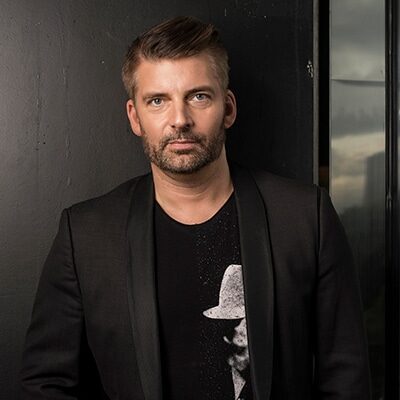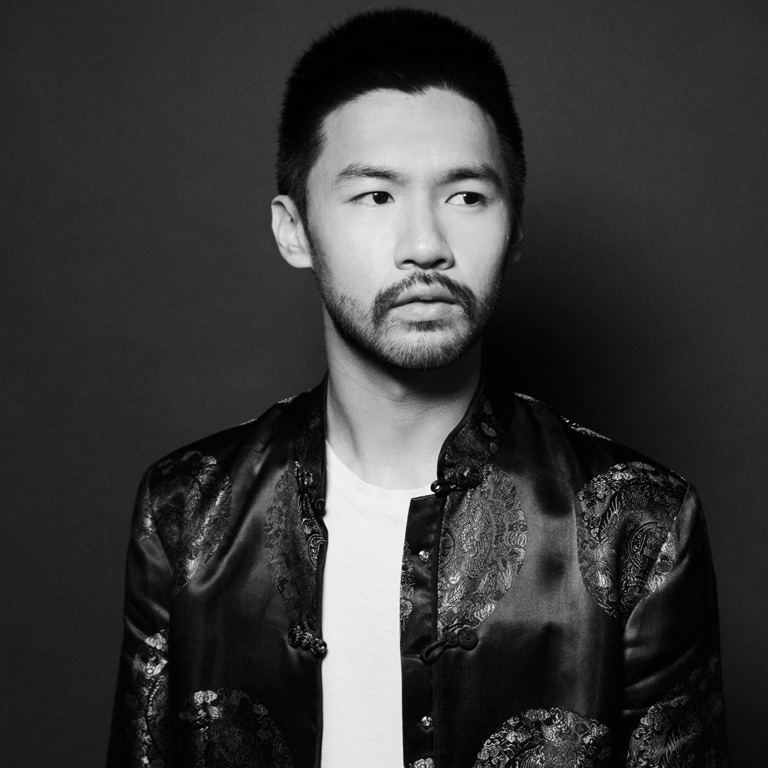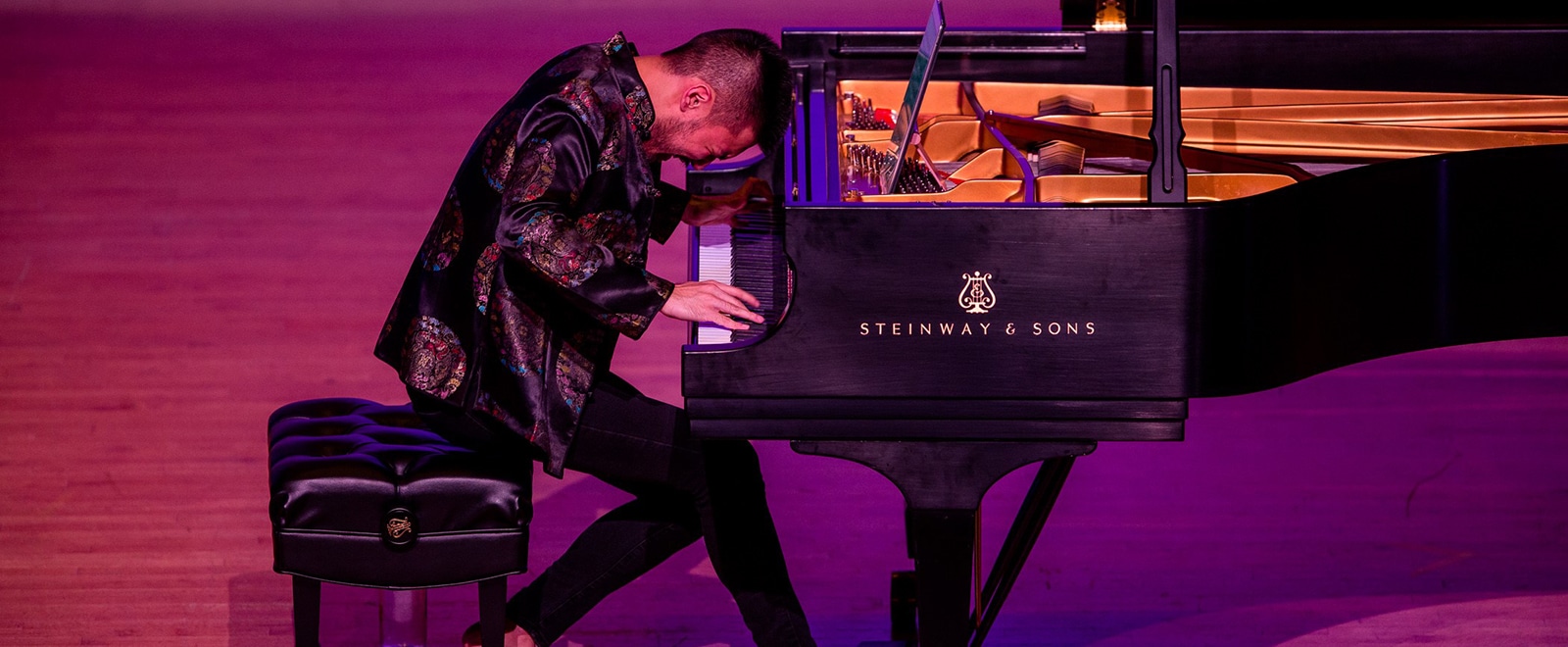
New York Magazine“Conrad is the kind of musician who is shaping the future of classical music.”
The New York Times“adventurous, agile and often electrifying as he navigated works both contemporary and classical.”
The Washington Post“Tao commanded the […] Piano with playing of assertive virtuosity, razor-sharp articulation, and an embrace of both the rhapsodic and the anarchic in the writing.”
The Baltimore Sun“Tao possesses startling technical elan and an ability to communicate clearly, no matter how thorny a score may become. He also has a hefty dash of charm.”
New York Times“[Tao’s] program… conveyed the scope of his probing intellect and openhearted vision.”
San Diego Union Tribune“If I could, I would hear every performance he plays.”
Boston Classical Review“Tao is foremost a musician’s pianist, who displays maturity and sensitivity beyond his youthful age. That was the effect of his Boston debut Wednesday night at Pickman Hall. Presented by the Celebrity Series, Tao’s recital of John Adams, Jason Eckardt, Schumann, Bach, and Beethoven reflected every shade of his soulful musical personality. Tao plays with remarkable precision and commanding presence. Subtle pauses between phrases and colorful tone recall the nuances and dynamism of Artur Schnabel and Martha Argerich. Yet there is a balance between power and delicacy that is all the pianist’s own.”
Financial Times“Then pianist Conrad Tao come onstage, and the casual atmosphere galvanised into something unforgettable. Tao was the feature for the remainder: Mozart’s Piano Concerto No 17, William Grant Still’s lyrical tone poem “Out of the Silence” and “Rhapsody in Blue” from Gershwin. Mozart and Gershwin are essentially traditional summer sounds in New York but rarely, if ever, heard like this. Tao was clearly having fun, while also being serious about the music. From his very first phrase in the piano concerto, he added quick and judicious embellishments to every line, minuscule grace notes that expanded the colour and charm in the music, and so idiomatic that one felt this was how it might have gone when the piece was new.”
Minneapolis Star Tribune“…an imaginative, energetic and sensitive pianist. The 28-year-old from Urbana, Ill., not only brought out all the turbulent emotions of Mozart’s 24th Piano Concerto, but emphasized the calm within the storm at key junctures. Similarly, his interpretation of C.P.E. Bach’s Concerto in D was full of fleet, fiery passages and involving slow meditations.”
San Francisco Chronicle“The concert opened with a splendid performance of Gershwin’s Piano Concerto in F, another work that’s written across musical genres. […] Soloist Conrad Tao’s poise, fierce technique and footloose grace were ideal for the brash extroversion of the outer movements. In the slow movement, his sincerity never veered into sentimentality…The concerto and the oratorio both received, and richly deserved, standing ovations.”
Conrad Tao is a pianist and composer celebrated for his boundary-defying artistry as well as his powerful performances of traditional repertoire. Described by New York Magazine as “the kind of musician who is shaping the future of classical music,” and praised by The New York Times for his “probing intellect and open-hearted vision,” Tao appears regularly as a soloist with leading orchestras and at major venues across the world.
In the 2025–26 season, Tao returns to the Chicago Symphony Orchestra as both soloist and recitalist, performing Bartók’s Piano Concerto No. 3 with Karina Canellakis and later presenting a recital program featuring Gershwin song arrangements alongside works by Schoenberg, Strayhorn, Schumann, and others. Recital highlights include debuts at Berlin’s Philharmonie and Hamburg’s Elbphilharmonie, as well as returns to Klavierfestival Ruhr, and to the Celebrity Series of Boston, and the Seattle Symphony with Poetry and Fairy Tales, a program blending works by David Fulmer, Rebecca Saunders, Todd Moellenberg, Brahms, and Ravel.
Tao reunites with Robert Spano for performances of John Adams’ Century Rolls (San Diego Symphony) and Bernstein’s The Age of Anxiety (Atlanta Symphony). He also joins Matthias Pintscher and the Konzerthausorchester Berlin for Pintscher’s NUR, and travels to Tokyo to perform Mozart’s Piano Concerto No. 17 with the NHK Symphony and Jaap van Zweden. He makes his harpsichord debut at Princeton University in Patricia Kopatchinskaja’s Dies Irae.
Recent highlights include his return to Carnegie Hall with Debussy’s 12 Études and his original composition Keyed In, as well as appearances with the San Francisco Symphony and Nicholas Collon, Philadelphia Orchestra and Marin Alsop, Boston Symphony and Dima Slobodeniouk, New York Philharmonic and Jaap van Zweden, and Cleveland Orchestra and Jahja Ling. In 2024, he also toured Europe with the Kansas City Symphony and Matthias Pintscher to mark the 100th anniversary of Rhapsody in Blue, with sold-out performances at the Elbphilharmonie, Berlin Philharmonie, and Concertgebouw.
Tao continues performing his own works, including Flung Out, an homage to Gershwin, which he played recently at the Aspen Festival, and The Hand, a companion to Beethoven’s Piano Concerto No. 1, which was commissioned and performed by the Kansas City Symphony. His orchestral work Everything Must Go premiered with the New York Philharmonic and later in Europe with the Antwerp Symphony. He also tours Counterpoint, his collaboration with dancer Caleb Teicher, and performs regularly with the Junction Trio alongside Stefan Jackiw and Jay Campbell. Additional recent collaborators include vocalist Charmaine Lee, artist Avram Finkelstein, choreographer Miguel Gutierrez, and brass quartet The Westerlies.
Tao’s acclaimed recordings include Voyages, Pictures, and American Rage (all on Warner), as well as the loser by David Lang, and Bricolage with The Westerlies.
He is a recipient of the Avery Fisher Career Grant, the Gilmore Young Artist Award, and a New York Dance and Performance “Bessie” Award for his collaboration with Caleb Teicher on More Forever.
JULY 2025
